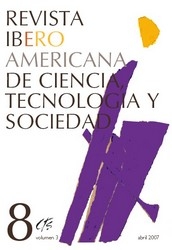Democracia en la frontera
DOI:
https://doi.org/10.52712/issn.1850-0013-949Palabras clave:
política científica, participación ciudadana, democratización de la cienciaResumen
En este artículo el autor efectúa una revisión crítica de los principales argumentos utilizados a favor y en contra de la apertura de las políticas de ciencia y tecnología a la participación ciudadana. Dicho examen está antecedido por una breve reflexión sobre los fundamentos conceptuales del desafío de la democratización de la ciencia, así como sobre los sentidos bajo los que cabe entender tal desafío. El ensayo se propone así realizar una contribución hacia una filosofía de la política científica.
Descargas
Citas
BELL, D. (1973): El advenimiento de la sociedad post-industrial, Madrid, Alianza, [1991].
BERLIN, I. (1990): El fuste torcido de la humanidad, Barcelona, Península, [1992].
BUSH, V. (1945): Science - The Endless Frontier, Washigton DC, National Science Foundation.
COLLINS, H.M., EVANS, R. (2002): “The Third Wave of Science Studies: Studies of Expertise and Experience”, Social Studies of Science, 32/2: 235-296.
CORBURN, J. (2005): Street Science: Community Knowledge and Envorinmental Health Justice, Cambridge, MIT Press.
DUNN, W.N. (1981/2004): Policy Analysis: An Introduction, 3ª ed., Upper Saddle River, NJ: Pearson-Prentice Hall.
ECHEVERRÍA, J. (2001): “Ciencia, tecnología y valores. Hacia un análisis axiológico de la actividad tecnocientífica”, en A. Ibarra y J.A. López Cerezo (eds.), Desafíos y tensiones en Ciencia, Tecnología y Sociedad, Madrid, Biblioteca Nueva.
EPSTEIN, S. (1996): Impure Science: AIDS, Activism, and the Politics of Knowledge, Berkeley, University of California Press.
FECYT (2005): Percepción social de la ciencia y la tecnología en España 2004, Madrid, Fundación Española para la Ciencia y la Tecnología.
FIORINO, D.J. (1990): “Citizen Participation and Environmental Risk: A Survey of Institutional Mechanisms”, Science, Technology, and Human Values 15/2: 226-243.
FISCHER, F. (2000): Citizens, Experts, and the Environment: The Politics of Local Knowledge, Durham-Londres, Duke University Press.
FRODEMAN, R., Mitcham, C. (2004): “New Directions in the Philosophy of Science: Toward a Philosophy of Science Policy”, Philosophy Today 48: 3-15.
FUNTOWICZ, S.O., RAVETZ, J.R. (1990): Uncertainty and Quality in Science for Policy, Dordrecht, Reidel.
GUSTON, D. (1999): “Evaluating the First U.S. Consensus Conference: The Impact of the Citizens’ Panel on Telecommunications and the Future of Democracy”, Science, Technology and Human Values 24/4: 451-482.
GUSTON, D.H., KENISTON, K. [eds.] (1994): The Fragile Contract: University Science and the Federal Government, Cambridge, MIT Press.
JASANOFF, S. (1995): “Procedural Choices in Regulatory Science”, Technology in Society 17: 279-293.
JASANOFF, S. (2005): Designs on Nature: Science and Democracy in Europe and the United States, Princeton, Princeton University Press.
LONGINO, H.E. (2002): The Fate of Knowledge, Princeton, Princeton University Press.
LÓPEZ CEREZO, J.A. [ed.] (2003): La democratización de la ciencia, San Sebastián, Erein.
MAYO, D.G., HOLLANDER, R.D. [eds.] (1991): Acceptable Evidence: Science and Values in Risk Management, Oxford, Oxford University Press.
MUÑOZ, E. (2005): “Gobernanza, ciencia, tecnología y política: trayectoria y evolución”, Arbor 715: 287-300.
NATIONAL RESEARCH COUNCIL (1996): Understanding Risk: Informing Decisions in a Democratic Society, Washington, D.C., National Academy Press.
PERHAC, R. M. (1998): “Comparative Risk Assessment: Where Does the Public Fit In?”, Science, Technology and Human Values 23/2: 221-241.
PFEFFER, N. (1987): “Artificial Insemination, In-vitro Fertilization and the Stigma of Infertility”, en M. Stanworth (ed.), Reproductive Technologies: Gender, Motherhood and Medicine, Minneapolis: University of Minnesota Press.
PLATÓN (1966): Obras completas, Madrid, Aguilar.
RAWLS, J. (1971): Teoría de la justicia, México DF, FCE, [1979].
RENN, O., WEBLER, T., WIEDEMANN, P. [eds.] (1995): Fairness and Competence in Citizen Participation, Dordrecht, Kluwer.
ROW, G., FREWER, L. (2005): “A Typology of Public Engagement Mechanisms”, Science, Technology and Human Values 30/2: 251-290.
ROW, G., FREWER, L. (2000): “Public Participation Methods: A Framework for Evaluation”, Science, Technology and Human Values 25/1: 3- 29.
SAREWITZ, D. (1996): Frontiers of Illusion: Science, Technology, and the Politics of Progress, Filadelfia, Temple University Press.
SEBASTIÁN, J., MUÑOZ, E. [eds.] (2005): Radiografía de la investigación pública en España, Madrid, Biblioteca Nueva.
SHRADER-FRECHETTE, K. (1991): Risk and Rationality: Philosophical Foundations for Populist Reforms, Berkeley, University of California Press.
TODT, O. (2003): “Potencialidades y riesgos de la participación”, en J.A. López Cerezo [ed.] (2003): La democratización de la ciencia, San Sebastián, Erein.
ZACHARY, G.P. (1999): Endless Frontier: Vannevar Bush, Engineer of the American Century, Cambridge, MIT Press.
Descargas
Publicado
Cómo citar
Número
Sección
Licencia
Derechos de autor 2025 CC Attribution 4.0

Esta obra está bajo una licencia internacional Creative Commons Atribución 4.0.
Todos los números de CTS y sus artículos individuales están bajo una licencia CC-BY.
Desde 2007, CTS proporciona un acceso libre, abierto y gratuito a todos sus contenidos, incluidos el archivo completo de su edición cuatrimestral y los diferentes productos presentados en su plataforma electrónica. Esta decisión se sustenta en la creencia de que ofrecer un acceso libre a los materiales publicados ayuda a un mayor y mejor intercambio del conocimiento.
A su vez, para el caso de su edición cuatrimestral, la revista permite a los repositorios institucionales y temáticos, así como también a las web personales, el auto-archivo de los artículos en su versión post-print o versión editorial, inmediatamente después de la publicación de la versión definitiva de cada número y bajo la condición de que se incorpore al auto-archivo un enlace a la fuente original.











